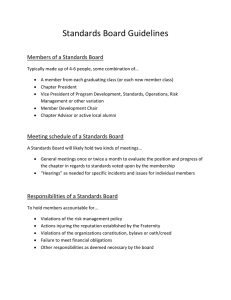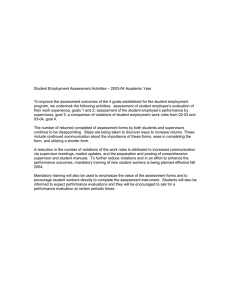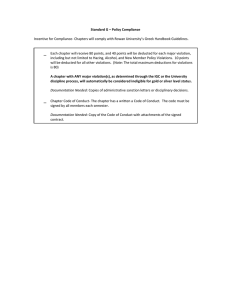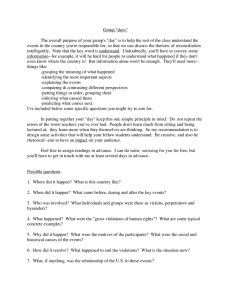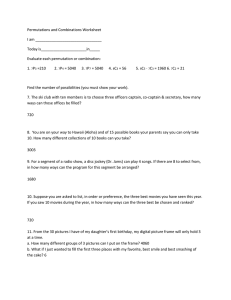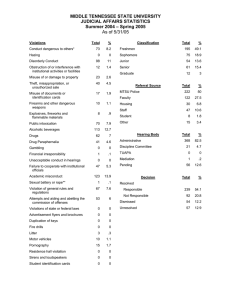Document 17690878
advertisement
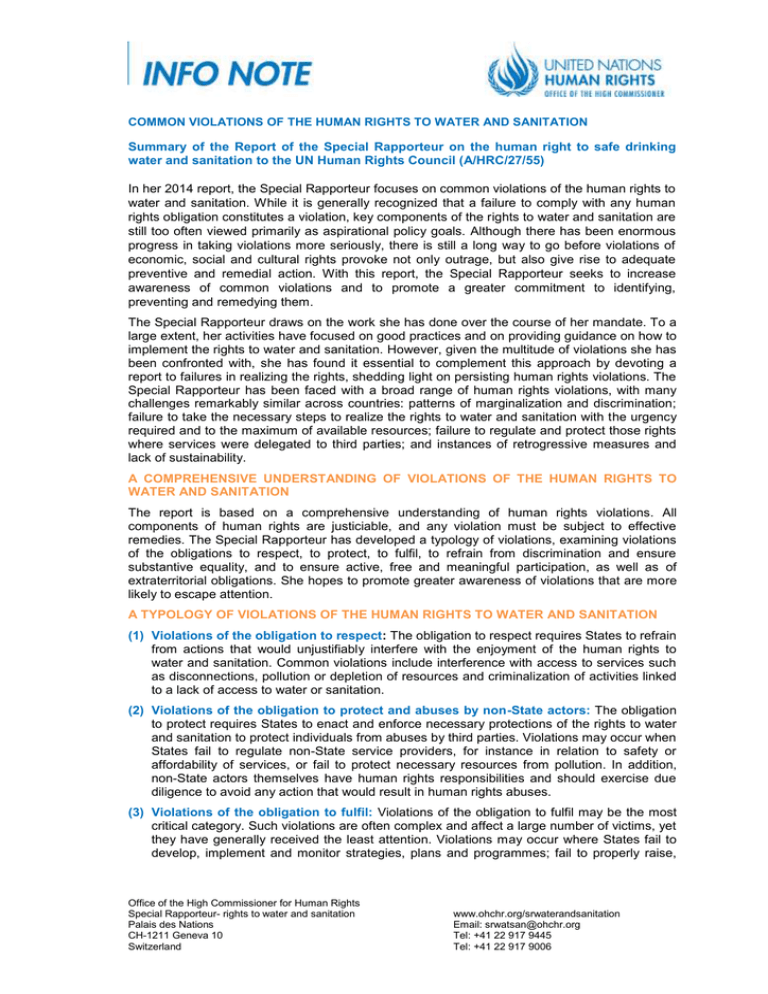
COMMON VIOLATIONS OF THE HUMAN RIGHTS TO WATER AND SANITATION Summary of the Report of the Special Rapporteur on the human right to safe drinking water and sanitation to the UN Human Rights Council (A/HRC/27/55) In her 2014 report, the Special Rapporteur focuses on common violations of the human rights to water and sanitation. While it is generally recognized that a failure to comply with any human rights obligation constitutes a violation, key components of the rights to water and sanitation are still too often viewed primarily as aspirational policy goals. Although there has been enormous progress in taking violations more seriously, there is still a long way to go before violations of economic, social and cultural rights provoke not only outrage, but also give rise to adequate preventive and remedial action. With this report, the Special Rapporteur seeks to increase awareness of common violations and to promote a greater commitment to identifying, preventing and remedying them. The Special Rapporteur draws on the work she has done over the course of her mandate. To a large extent, her activities have focused on good practices and on providing guidance on how to implement the rights to water and sanitation. However, given the multitude of violations she has been confronted with, she has found it essential to complement this approach by devoting a report to failures in realizing the rights, shedding light on persisting human rights violations. The Special Rapporteur has been faced with a broad range of human rights violations, with many challenges remarkably similar across countries: patterns of marginalization and discrimination; failure to take the necessary steps to realize the rights to water and sanitation with the urgency required and to the maximum of available resources; failure to regulate and protect those rights where services were delegated to third parties; and instances of retrogressive measures and lack of sustainability. A COMPREHENSIVE UNDERSTANDING OF VIOLATIONS OF THE HUMAN RIGHTS TO WATER AND SANITATION The report is based on a comprehensive understanding of human rights violations. All components of human rights are justiciable, and any violation must be subject to effective remedies. The Special Rapporteur has developed a typology of violations, examining violations of the obligations to respect, to protect, to fulfil, to refrain from discrimination and ensure substantive equality, and to ensure active, free and meaningful participation, as well as of extraterritorial obligations. She hopes to promote greater awareness of violations that are more likely to escape attention. A TYPOLOGY OF VIOLATIONS OF THE HUMAN RIGHTS TO WATER AND SANITATION (1) Violations of the obligation to respect: The obligation to respect requires States to refrain from actions that would unjustifiably interfere with the enjoyment of the human rights to water and sanitation. Common violations include interference with access to services such as disconnections, pollution or depletion of resources and criminalization of activities linked to a lack of access to water or sanitation. (2) Violations of the obligation to protect and abuses by non-State actors: The obligation to protect requires States to enact and enforce necessary protections of the rights to water and sanitation to protect individuals from abuses by third parties. Violations may occur when States fail to regulate non-State service providers, for instance in relation to safety or affordability of services, or fail to protect necessary resources from pollution. In addition, non-State actors themselves have human rights responsibilities and should exercise due diligence to avoid any action that would result in human rights abuses. (3) Violations of the obligation to fulfil: Violations of the obligation to fulfil may be the most critical category. Such violations are often complex and affect a large number of victims, yet they have generally received the least attention. Violations may occur where States fail to develop, implement and monitor strategies, plans and programmes; fail to properly raise, Office of the High Commissioner for Human Rights Special Rapporteur- rights to water and sanitation Palais des Nations CH-1211 Geneva 10 Switzerland www.ohchr.org/srwaterandsanitation Email: srwatsan@ohchr.org Tel: +41 22 917 9445 Tel: +41 22 917 9006 allocate and utilize the maximum available resources; engage in corrupt practices; adopt unjustified retrogressive measures; fail to prioritize the necessary steps to ensure minimum essential levels of access to water and sanitation; or fail to provide adequate services in public facilities and institutions and in emergency situations. In the light of limited jurisprudence addressing States’ failures to progressively realize the rights to water and sanitation, the Special Rapporteur urges States to ensure that courts have the authority to adjudicate such cases. (4) Violations of the obligation to refrain from discrimination and to ensure substantive equality: The prohibition of discrimination is of immediate effect, while positive measures to ensure substantive equality may require resource allocation and infrastructure development over time. Moreover, States have an obligation to prevent and combat stigmatization and to protect against discriminatory practices in the private sphere. Violations may result from systematic neglect or exclusion of certain groups or individuals, a failure to address systemic patterns of inequalities, to reasonably accommodate persons with disabilities, or to combat stigmatization and discrimination. What has become increasingly clear to the Special Rapporteur is that systemic and widespread denials of access to water and sanitation are first and foremost driven by patterns of discrimination and exclusion. Challenging violations of the rights to water and sanitation invariably confronts endemic patterns of inequalities. More efforts are needed, in particular with regard to addressing discrimination faced by persons with disabilities, inequalities based on socioeconomic status, and discrimination and stigmatization which are deeply entrenched in society. (5) Violations of the obligation to ensure active, free and meaningful participation: States have an obligation to ensure active, free and meaningful participation. While it is often stressed that participation has significant instrumental value in ensuring more sustainable results, participation is a human right in itself, and non-compliance with the relevant human rights obligations may give rise to violations. (6) Violations of extraterritorial obligations: Violations of extraterritorial obligations are a growing concern in relation to the human rights to water and sanitation, for instance in the context of transboundary water resources, the activities of transnational corporations, or donor activities. States’ human rights obligations extend extraterritorially requiring them to ensure the right to a remedy in such constellations. Violations of the human rights to water and sanitation receive increasing attention, but progress has not been equal across the full range of obligations or for all groups of rights holders. Access to justice for violations at a more structural or systemic level, particularly in relation to the obligation to progressively realize the rights to water and sanitation, to avoid retrogressive measures and to achieve substantive equality, has lagged behind access to justice for violations linked to the obligations to respect and to protect. Violations related to inequalities experienced by certain groups, such as people living in poverty, informal settlements, or rural and remote communities, or homeless people, have remained largely unchallenged in courts, despite their severity. Furthermore, violations of the right to sanitation in general have not received the attention they deserve. Victims of violations of the right to sanitation are among the most stigmatized and marginalized in society, and there remain taboos preventing an open discussion about the indignities linked to unhygienic conditions. ACCESS TO JUSTICE The purpose of a more focused analysis of violations of the rights to water and sanitation is to promote more concerted action to ensure access to justice. The Special Rapporteur emphasizes a remedial rather than punitive approach. While it is important in some cases to hold those responsible for violations accountable for their actions, the general focus should be on what needs to be done to remedy violations and on who is responsible for remedying violations, rather than on who is to blame. Transformative remedies can move claimants further towards the full enjoyment of human rights. Without such remedies, there is a risk that access to justice will be limited to those people who are in a position to seek remedies for themselves and will preclude claims in the public interest. Violations of the rights to water and sanitation are often connected with systemic patterns of exclusion and unequal power relationships. Beyond remedying individual violations, identifying patterns of violations will also help to prevent such violations and will require governments to address their structural causes. The lack of claims being heard that address the most critical, wide-ranging and complex violations of the rights to water and sanitation, then this should not be interpreted as meaning that such violations do not take place, but rather suggests that the justice system must be transformed. Many judicial systems give preference to claims based on negative obligations over those based on positive obligations, claims to immediately enforceable remedies over longer-term transformative ones, and claims affecting individuals over claims that require systemic changes. This preference can no longer be permitted to deny victims of human rights violations the remedies they are entitled to. The consequences of denying access to justice for the most egregious violations are too severe to be contemplated. Courts, human rights institutions, governments and advocates must redefine justice and the role of courts in relation to what human rights require and ensure access to effective remedies. The report is available in all UN languages at: http://www.ohchr.org/EN/Issues/WaterAndSanitation/SRWater/Pages/AnnualReports.asp x
